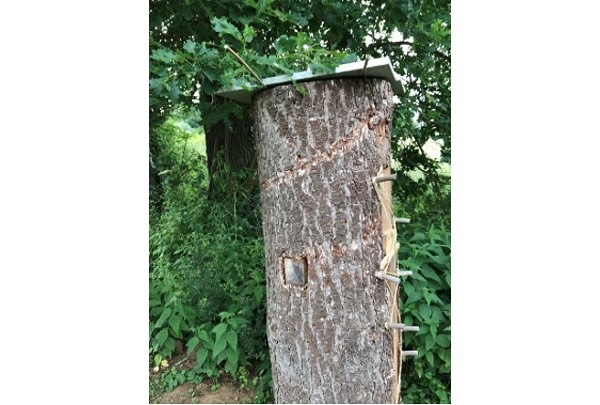 Log bee home;
Credit: c John Park
Log bee home;
Credit: c John Park
Honey Bee Wild, together with support from the Luxembourg National Research Fund (FNR), is calling for citizen scientists to participate in its Log Bee Home project.
The project is two-fold: engaging local artists and woodworkers to create cavities in large logs that can serve as natural habitat homes for honey bee colonies, and inventorying and monitoring the progress of these bee colonies.
An information session is being held on Thursda, 5 July 2018 at 19:00 for anyone interested in participating.
“You do not need to know anything about bees, and you do not need to know anything about beekeeping,” said Michel Wilwert, Honey Bee Wild volunteer. “You only need to be curious about how bees live in the wild.”
The project is about developing honey bee colonies with minimal human intervention in order to strengthen the local gene pool. These colonies are referred to as “unmanaged.” Unlike conventional beehives, no honey or other products will be taken from these bees. “We want to intervene as little as possible,” Wilwert said.
To provide habitat for these colonies, Honey Bee Wild (and other organisations across Europe) has initiated creating log bee homes based on a traditional method of keeping bee colonies in trees that dates back to the Middle Ages. The creation of log bee homes enables people to help the honey bee by increasing the availability of natural habitat for them, which will facilitate their adaptation to environmental changes.
You don’t have to be a lumberjack to participate, however. “Yes, we are recruiting experienced woodworkers to help create the log bee homes,” Wilwert explained. “And we would love to see artists and craftsmen participate in that creation, too. But once the logs are inhabited by bees, the emphasis becomes the participation of citizen scientists to help us monitor what happens to the bees once they are living in a log.”
A citizen scientist is anyone who voluntarily contributes time, effort, and resources toward scientific research in collaboration with professional scientists or alone. You do not need to have a formal science background to be a citizen scientist.
At the July 5 information session, Honey Bee Wild will inform potential citizen scientists of the project objectives and explain the honey bee lifecycle, why unmanaged bees are necessary, why it is taking an inventory of log bee homes, how to take an inventory, why it is monitoring, how to monitor, and proposed indicators.
A subsequent practical session will be organised at a log bee home in the field to explain the data to be collected for the inventory and for each monitoring visit. In the autumn, Honey Bee Wild intends to organize an event where citizen scientists can help create additional log bee homes.
So where will the log homes end up?
“We continue to look for appropriate places to put these bee homes,” said Wilwert. “We need eight more sites for 2018. We cannot use private gardens, but are open to talking to businesses, municipalities, and farmers, for example.”
For more information and to register for the 5 July information session, go to https://www.eventbrite.com/e/will-you-bee-a-citizen-scientist-tickets-46560657179
Honey Bee Wild is a group of Luxembourg-based volunteers who are passionate about establishing natural habitats for honey bees to develop with a minimum of human intervention. They have been organising and running events for the public to raise awareness of the importance of biodiversity and pollinators, including honey bees, since 2014.
This project is supported by the Luxembourg National Research Fund (FNR).
 Log bee home;
Credit: c John Park
Log bee home;
Credit: c John Park








